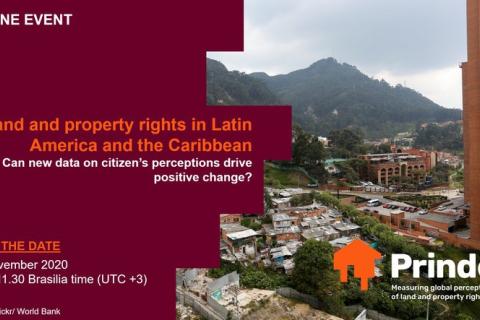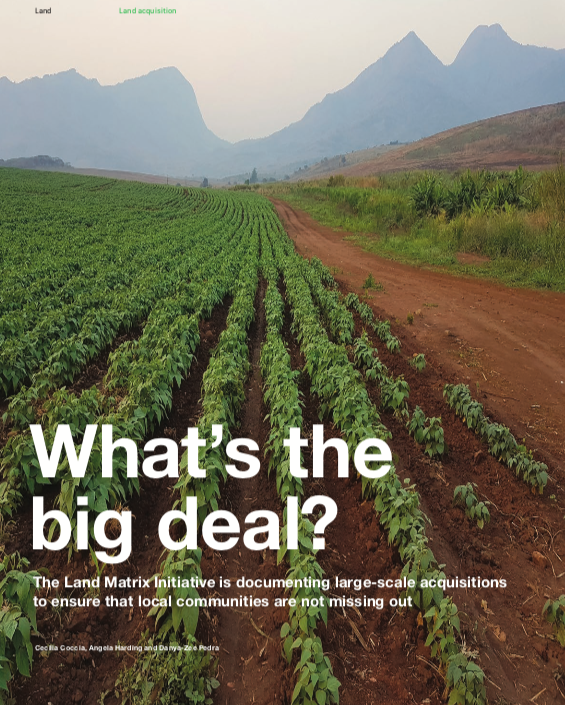
Topics and Regions
Details
Location
Contributions
Displaying 181 - 190 of 406The challenges of good land governance in the Arab region
The Arab region suffers from many challenges in the land governance and land management sector. Most importantly, tenure insecurity in the Arab region is the highest in the world. In the Worldbank’s Registering Property- Doing Business indicator, the region ranks lower than any other region, with the exception of some Gulf Cooperation Council countries. Tenure insecurity negatively affects many aspects of the economy including urbanization, agricultural development, the private sector and women's empowerment, just to name of a few.
A New Hope
This is the story of how dozens of communities in Mozambique are mapping and documenting their own land rights. "A New Hope" is the winner of the Land Portal's Second Data Story Contest, and is authored by the team at Terra Firma Mozambique.
Side Event of the GLTN's 8th Biennium Partners Meeting: Innovative and effective communications strategies in the time of Covid-19
Covid-19 has no doubt changed the way we interact with one another and the way we are able to effectively communicate in our day to day lives. When it comes to leveraging visibility for land rights globally, and keeping land on the agenda and minds of a variety of stakeholders, Covid-19 has forced us to pivot as well as innovate in our methods of communication. Traditional co
Land and property rights in the Middle East and North Africa
Land and property rights are an essential to building just and equitable societies. Yet Prindex data shows that more than 1 in 4 people living in the Middle East and North Africa fear for these rights – a higher proportion than anywhere else in the world.
Land and property rights in Latin America and the Caribbean
What can perceptions of data tell us about tenure insecurity?
Free online event
Thursday 24 November 2020
9.00 - 11.00 am Colombia Standard Time (UTC-5)
Measuring land insecurity in sub-Saharan Africa
Can new data on citizen's perceptions drive positive change?
Free online event
Wednesday 2 December 2020
10.00 - 12.00 pm UTC
RICS Land Journal: Winds of Change
Soaring food and fuel prices and the instability of global financial markets have prompted agri-businesses, investment banks, and food- and energy-hungry nations to secure resources in countries where land is available, or is made available, for investment. Given that access to land is closely linked to food security, poverty alleviation, sustainable livelihoods and rural transformation, and that large-scale land acquisitions (LSLAs) can hinder such access, it’s important to monitor these deals.
(please refer to page 12 of the journal to read more)
Large Scale Land Acquisitions in Kenya
In Kenya, the total land area of the country is 58 million hectares (ha), of which only around 10% is classified as arable land. As of January 2020, the Land Matrix had recorded a total of 14 concluded deals in the country, totalling 269 411 ha, or just 0.46% of the total land area. Although this is a relatively small land footprint, these deals may still have significant implications for local communities and indigenous people. It is important to note that in this country profile, regional filters were used to sort and extract the data on the Land Matrix online platform.
International Land Deals for Agriculture
Large-scale land acquisitions continue to be an important issue for governments, development organisations, NGOs and farmers’ organisations all over the world; this remains the case even in times of global economic slowdown, recession and crisis. The scale of this trend and its significant impacts on rural transformation and livelihoods make it necessary to further monitor, observe and positively influence such deals wherever possible.
LandVoc brochure
This brochure provides a brief inroduction to LandVoc, the linked land governance thesaurus. Logistical as well as technical information are provided.









